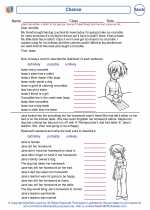Weather Forecasts
Weather forecasts are predictions and descriptions of the current and future atmospheric conditions. They are created using data collected from various sources such as satellites, weather stations, and radar systems. Meteorologists use this data to make projections about temperature, precipitation, wind patterns, and other weather phenomena for specific locations and time periods.
Weather forecasts are important for a variety of reasons. They help individuals and communities prepare for potentially hazardous weather conditions such as storms, extreme temperatures, or flooding. Forecasts also assist businesses, agriculture, and transportation industries in planning and decision-making.
Types of Weather Forecasts
There are several types of weather forecasts:
- Short-term forecasts: These predict weather conditions for the next few hours to a few days. They are useful for planning daily activities and events.
- Medium-range forecasts: These cover a timeframe of about 3 to 7 days. They provide a general outlook for the upcoming week and are helpful for scheduling outdoor activities and travel plans.
- Long-range forecasts: These extend beyond 7 days and are more uncertain due to the complexity of weather patterns. They are used for general trend analysis and seasonal planning.
- Specialized forecasts: These focus on specific weather events such as hurricanes, tornadoes, or winter storms. They are critical for public safety and emergency preparedness.
Forecasting Methods
Meteorologists use various methods to create weather forecasts:
- Observation and data analysis: They collect and analyze current weather data to identify patterns and trends.
- Numerical weather prediction: This involves using computer models to simulate and predict future weather conditions based on mathematical equations and atmospheric physics.
- Satellite and radar technology: These tools provide real-time images and data to monitor weather patterns and predict their movement.
- Climatology and historical data: Past weather patterns and trends are studied to make informed predictions about future weather events.
Accuracy and Limitations
While weather forecasts have improved significantly with advances in technology and scientific understanding, they are not always 100% accurate. Factors such as sudden atmospheric changes, local microclimates, and the inherent complexity of weather systems can lead to uncertainties in predictions. It's important for individuals and organizations to stay informed and flexible when making decisions based on weather forecasts.
Overall, weather forecasts play a crucial role in daily life, providing valuable information for planning, safety, and environmental awareness.
[Weather Forecasts] Related Worksheets and Study Guides:
.◂Math Worksheets and Study Guides Second Grade. Probability

 Worksheet/Answer key
Worksheet/Answer key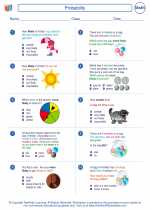
 Worksheet/Answer key
Worksheet/Answer key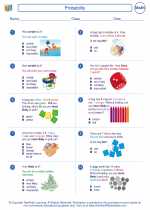
 Worksheet/Answer key
Worksheet/Answer key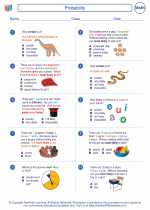
 Worksheet/Answer key
Worksheet/Answer key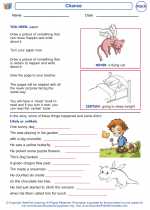
 Worksheet/Answer key
Worksheet/Answer key
 Worksheet/Answer key
Worksheet/Answer key
 Worksheet/Answer key
Worksheet/Answer key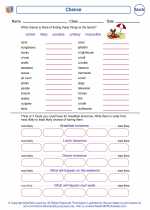
 Worksheet/Answer key
Worksheet/Answer key